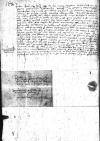Vergente ad calcem mense proxime praeterito ⌊⌋ Dominationi Vestrae super negotiis tunc emergentibus ad statum praesertim et ⌊concilii⌋ huius[1] vocationem pertinentibus misique breve apostolicum per operam domini ⌊Anthonii Fuggari⌋ Augustani cum aliis litteris ad ⌊Gedanum⌋. Breve quidem illud erat pro capienda possessione canonicatus mei Lubicensis secundum informationem eidem annexam. Quod cum Reverendissima Paternitas Vestra iuxta meam fiduciam disposuerit, dignetur mihi rescribere, qualiter negotium hoc sit deductum.
Nunc autem renovo ⌊⌋, quia magnum novum a ⌊sanctissimo domino nostro⌋ et ⌊collegio reverendissimorum dominorum cardinalium⌋ ⌊huc⌋ allatum est, hoc videlicet in scriptis pontificis et eorundem cardinalium, quod 1545-12-13⌊dominica 3-a Adventus Domini1545-12-13⌋ ⌊generale concilium⌋ hic aperietur mandatumque est omnibus episcopis Italicae nationis (alias hinc exeuntibus pro solaciis), ut eo termino sub nota anathematis hic sint praesentes. Quomodo autem oboediant, subsequentes meae litterae in futurum ostendent.
De ⌊Hispania⌋ ⌊episcopus Civitatensis⌋ vir doctus et religiosus ⌊huc⌋ venit pluresque venturi sunt, ubi seriosius aliquid peragetur. Cardinalis hic Tridentinus dominus ⌊Madrucius Christophorus⌋ celebrem memoriam Dominationis Vestrae Reverendissimae semper facit, item et episcopi ⌊Galliarum⌋, ⌊Redonensis⌋ praecipue, et ⌊Castelli Maris Hispanus⌋ cum aliis, qui mihi mira, sed non ignota de iucunda conversatione eiusdem Reverendissimae Dominationis Vestrae narrant. Quaerunt a me sollicite, quomodo nunc se habet Reverendissima Dominatio Vestra. Respondeo, quod curent de se, non de vobis,
cf. Vulg. Io 9,23 Quia aetatem habet, ipsum interrogate ⌊quia aetatem habetiscf. Vulg. Io 9,23 Quia aetatem habet, ipsum interrogate ⌋
ita, ut unicuique opus sit attendere, quod scriptum sit psalmo 89
cf. Vulg. Ps CLI 89,9 anni nostri sicut aranea meditabuntur ⌊anni nostri sicut aranea meditabunturcf. Vulg. Ps CLI 89,9 anni nostri sicut aranea meditabuntur ⌋
etc.
Principalis episcoporum ⌊Hispaniae⌋ ⌊Giennensis⌋ admirabili caritate afficitur negotiis meis, etiam tanto effectu, quod mihi fecerat fieri pretiosas vestes hiemales de panno Hispanico, dum videret me sericeis aestivo more tamquam viatorem levibus indutum ad faciliorem molem. Vestes meas hiemales ⌊Veneciis⌋ cum melioribus meis rebus relictas habeo apud ⌊secretarium dominii Venetorum⌋, sperans me posse hinc quandoquidem ad litus vestrum descendere, sed ⌊ipse⌋, qui ardenter me diligit, more impatiens hunc decorem suis sumptibus mihi fieri fecit maioraque intendit pro me facere, ubi opus est, apud ⌊caesaream maiestatem⌋. ⌊Is episcopus⌋ iam declaratus et nominatus est cardinalis ad intimam instantiam ⌊imperatoris⌋. Reliqui etiam episcopi ⌊Galliarum⌋ et Italicae nationis mira dilectione meam humilitatem prosequuntur. Valebit forsan in aliquo casu, licet adhuc nihil ab eis supplicare sit opus.
De ⌊concilio⌋ autem, ut progrediatur pro sano discursu aperiendo, horologium tale non video volvi, ut fortiter procedat, propter ⌊landgravium Hassiae⌋, qui IX-M[2] peditum et sex milibus equitum stipatus confusionem facit in ⌊Germania⌋ pro favore ⌊Luteranorum⌋ itemque desperatio est de ⌊nuntiis⌋ ⌊caesaris⌋ et ⌊Galli⌋, ut nec pacem, nec indutias impetrare credantur a ⌊Turcha⌋ pro respiratione Christianorum. 9 Novembris ⌊Petrus Lando⌋ dux Venetorum mortuus est. Quem vero suscipiet successorem, alias, quatenus opus est, perscribam Reverendissimae Dominationi Vestrae.
Quam iterum atque iterum rogo, ut me meaque negotia coepiscopis suis amicis Plocensi, ⌊Posnaniensi⌋, Cracoviensi, Wladislaviensi ac ⌊Gnesnensi novo⌋ archiepiscopo commendet, quantum mihi permittant pensionem ex sacerdotiis diocesium suarum, de quibus mihi ⌊pontifex⌋ alias providit. Duri sunt ⌊episcopus Posnaniensis⌋ et ⌊capitulum⌋, quod nullo casu adhuc permiserant mihi possessionem canoniae me(!) ante triennium in ⌊urbe⌋ vacantis concessae, prout expedite bullae meae declarant. Habent quemdam intrusum satis pecuniosum. Si vixero, curabo, quod opus habebit illis pro replendo puteo Romanorum officialium etc. ⌊Episcopus Posnaniensis Sebastianus⌋, quia lacrimas carissimi ⌊fratris mei⌋ measque (ut sacerdotium nobis ambobus pro sobria sustentatione nostra
<conferret)>
non audiret aut exaudiret, simul tempore cum ⌊pauperrimo archiepiscopo⌋ ab hoc mundo raptus est tamquam cum ⌊Lazaro⌋ epulo dives. Ter scripsit ⌊eidem Posnaniensi⌋ in hoc casu rex q[uoque] ⌊Sigismundus⌋, bis monuit, ut nobis succurreret, sed homo severae rel[igio]nis numquam dignatus est respondere unum verbum. Quam autem pietatem (sub iugo Domini et pari necessitate gemens) ego a moderno ⌊Paulo⌋ ex[pe]riar, indicabunt fructus petitionis meae et amicorum diu exspecta[ti]. Iuvet igitur honestum desiderium meum Reverendissima Dominatio Vestra.
Quam Deo ex intimo corde semper commendo.

